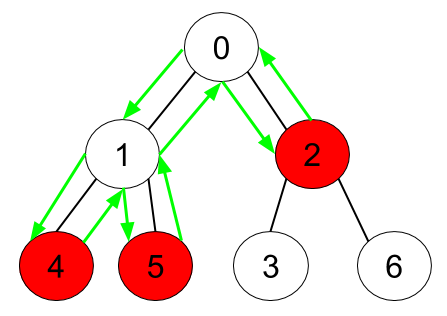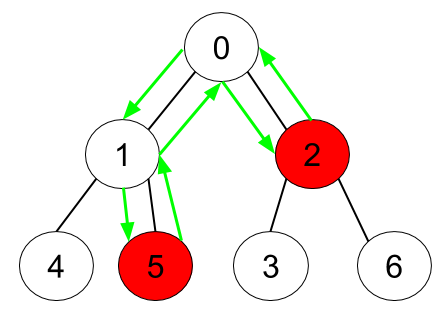Problem
Given an undirected tree consisting of n vertices numbered from 0 to n-1, which has some apples in their vertices. You spend 1 second to walk over one edge of the tree. **Return the minimum time in seconds you have to spend to collect all apples in the tree, starting at *vertex 0* and coming back to this vertex.**
The edges of the undirected tree are given in the array edges, where edges[i] = [ai, bi] means that exists an edge connecting the vertices ai and bi. Additionally, there is a boolean array hasApple, where hasApple[i] = true means that vertex i has an apple; otherwise, it does not have any apple.
Example 1:

Input: n = 7, edges = [[0,1],[0,2],[1,4],[1,5],[2,3],[2,6]], hasApple = [false,false,true,false,true,true,false]
Output: 8
Explanation: The figure above represents the given tree where red vertices have an apple. One optimal path to collect all apples is shown by the green arrows.
Example 2:

Input: n = 7, edges = [[0,1],[0,2],[1,4],[1,5],[2,3],[2,6]], hasApple = [false,false,true,false,false,true,false]
Output: 6
Explanation: The figure above represents the given tree where red vertices have an apple. One optimal path to collect all apples is shown by the green arrows.
Example 3:
Input: n = 7, edges = [[0,1],[0,2],[1,4],[1,5],[2,3],[2,6]], hasApple = [false,false,false,false,false,false,false]
Output: 0
Constraints:
1 <= n <= 105edges.length == n - 1edges[i].length == 20 <= ai < bi <= n - 1hasApple.length == n
Solution
/**
* @param {number} n
* @param {number[][]} edges
* @param {boolean[]} hasApple
* @return {number}
*/
var minTime = function(n, edges, hasApple) {
var nodeMap = Array(n).fill(0).map(() => []);
for (var i = 0; i < edges.length; i++) {
nodeMap[edges[i][0]].push(edges[i][1]);
nodeMap[edges[i][1]].push(edges[i][0]);
}
return dfs(0, nodeMap, hasApple, Array(n))[1];
};
var dfs = function(root, nodeMap, hasApple, visited) {
if (visited[root]) return [false, 0];
var has = hasApple[root];
var time = 0;
visited[root] = true;
for (var i = 0; i < nodeMap[root].length; i++) {
var item = dfs(nodeMap[root][i], nodeMap, hasApple, visited);
if (item[0]) {
has = true;
time += item[1] + 2;
}
}
return [has, time];
};
Explain:
nope.
Complexity:
- Time complexity : O(n).
- Space complexity : O(n).